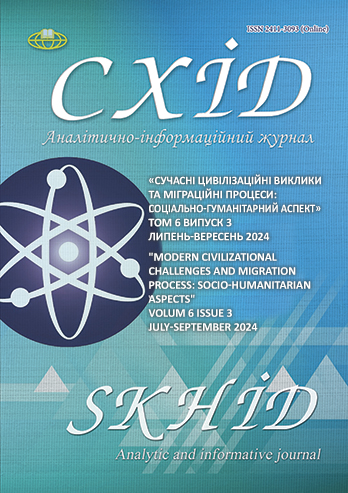Inequality as a challenge in the Western cultural and civilizational paradigm
DOI:
https://doi.org/10.21847/2411-3093.637Keywords:
inequality, struggle for equality, egalitarianism, antagonistic contradictions, revolution, existential rebellion, nihilism, Faustian typeAbstract
The article focuses on the problem of social inequality in the Western cultural and civili-zational paradigm. It is noted that in the history of Western philosophy and culture, there have always been two different approaches to understanding inequality. The first path of elitism involved the apology for inequality, proposing ideas of aristocracy (inequality within a single society) or racial domination (inequality between peoples and civilizations). This phil-osophical tradition can be called traditional-authoritarian (Plato, Aristotle) or romantic-conservative (H. Chamberlain). The second way is egalitarian, which insists on creating a society built on the idea of equality (the philosophy of liberalism and Marxism). If representa-tives of the liberal wing of egalitarianism (Locke, Bentham) focus on the justification of a society of equal opportunities with an emphasis on natural human rights, the tradition of Marxism tends to consider social contradictions caused by inequality as antagonistic. There-fore, protest, revolution, rebellion become a specifically Western way of eradicating inequali-ty (Marx, Camus). At the same time, the article notes that the deep worldview basis of this way of solving the problem of inequality is the nihilistic nature of Western civilization, its "Faustian spirit" (Spengler).
Downloads
References
Bentham, J. (2018). An introduction to the principles of morals and legislation. Reprint edition. Retrieved from https://www.econlib.org/library/Bentham/bnthPML.html
Camus, A. (2018). The Myth of Sisyphus. Vintage Inter-national, Knopf Doubleday Publishing Group.
Chamberlain, H. S. (1912). Foundations of the 19th Cen-tury. The Bodley Head. Retrieved from https://web.archive.org/web/20071223072601/-http://www.hschamberlain.net/grundlagen/division2_chapter5.html
Dover, K. (1974). Greek Popular Morality in the Time of Plato and Aristotle. Oxford University Press.
Eisenstadt, Shmuel Noah (1978). Revolution and trans-formation of societies. A comparative study of civiliza-tions. New York, Free Press.
Gusiev, V. I. (2000). Kant: philosophical substantiation of peace idea. Naukovi zapysky, 18, Filosofiya ta relihi-yeznavstvo / Natsionalʹnyy universytet Kyyevo-Mohylyansʹka akademiya (in Ukrainian) https://ekmair.ukma.edu.ua/server/api/core/bitstreams/8d297d4b-17f2-4023-ba44-a037e53d6eab/content
Hofstede, G. (2001). Culture`s consequences: Compar-ing values, behaviors, institutions and organizations across the nations. Thousands Oaks, CA: Sage.
Ilyenkov, E. (1975). The dialectics of abstract and con-crete in Marx`s Capital. International friends of Ilyen-kov. https://ilyenkovfriends.org/document-archive/
Kipling, R. (1899). The white man`s burden. The Kipling society. https://www.kiplingsociety.co.uk/poem/poems_burden.htm
Lipin, М. (2020). Ancient Greek polis as the space for the development of thinking. Scientia Fructuosa, 129 (1), 14–27. https://doi.org/10.31617/visnik.knute.2020(129)02 (In Ukrainian)
Locke, J. (1988). Two treatises of government. York Uni-versity. Cambridge University Press.
Marx, K. (1968). Selected Works in One Volume. Lon-don, Lawrence & Wishart.
Morozov, A. (2018). Nihilism and pseudo-spirituality: humanity at the crossroads. Scientia Fructuosa, 117(1), 5–14. Retrieved from https://journals.knute.edu.ua/scientia-fructuosa/article/view/673 (in Ukrainian)
Nechyporenko, V. (2013). Normative and value justifica-tion of a just state. In Value and normative justifica-tion of social theories. Kyiv, Institute of Philosophy of the Academy of Sciences of Ukraine. (in Ukrainian).
Popper, K. (1994). The Open Society and Its Enemies. Princeton University Press.
Sarkisyanz, E. (2003). Hitler's English Inspirers. Based on lectures given at Heidelberg University. South Asia Institute. Athol Books, Belfast.
Spengler, O. (1991). The Decline of the West. Abridged Edition. Oxford University Press.
Toynbee, А. (1963). A Study of History. In two volumes. Oxford University Press.
Vlastos, G. (1981). Platonic Studies. Princeton University Press.
Downloads
Published
How to Cite
Issue
Section
License
Copyright (c) 2024 Максим Бірюк

This work is licensed under a Creative Commons Attribution-NonCommercial-NoDerivatives 4.0 International License.
1. Authors bear responsibility for the accuracy of facts, quotations, numbers and names used.
2. Manuscripts are not sent back.
3. The publisher does not always agree with the authors' opinion.
4. The authors reserve the right to authorship of the work and pass the first publication right of this work to the journal under the terms of a Creative Commons Attribution-NonCommercial-NoDerivatives 4.0 International License. This license allows others to distribute (copy) the published work for non-commercial purposes, provided there is mandatory attribution to its authors and a link to the first publication in our journal.
5. The authors have the right to conclude separate supplement agreements that relate to non-exclusive work distribution in the form in which it has been published by the journal (for example, to upload the work to the online storage of the journal or publish it as part of a monograph), provided that the reference to the first publication of the work in this journal is included.

